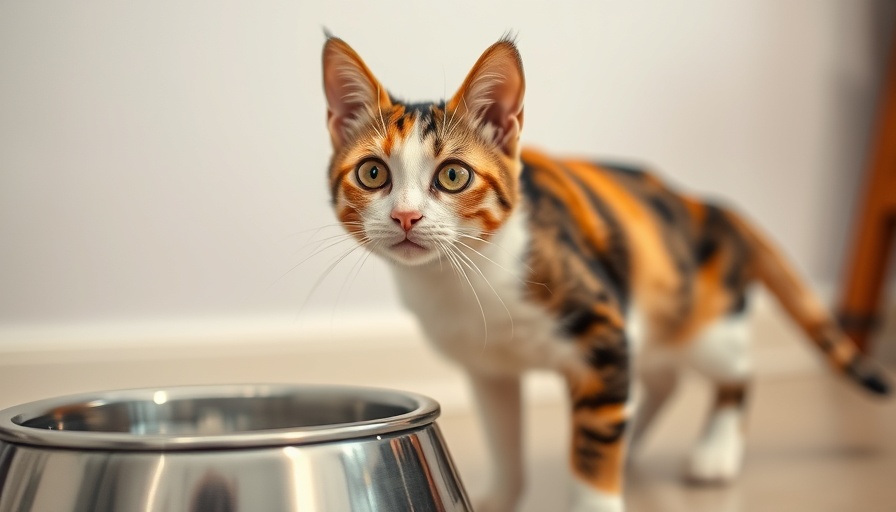
A Hidden Danger: Understanding EPI in Cats
Have you noticed your cat acting hungrier than usual yet appears to be losing weight at an alarming rate? This unsettling paradox can be distressing for any cat owner, leaving you puzzled and worried. While a ravenous appetite might normally signify good health, it could also be a sign of a serious condition called Exocrine Pancreatic Insufficiency (EPI). This article will help you understand what EPI is, its symptoms, and how to manage your cat’s health effectively.
The Unsung Hero: The Role of the Pancreas
The pancreas plays a crucial but often overlooked role in a cat's body, responsible for both hormonal and digestive functions. On one hand, it produces insulin, which regulates blood sugar levels. On the other, it releases digestive enzymes that help break down food in the small intestine. When the pancreas fails to produce enough digestive enzymes—due to conditions like chronic pancreatitis—it leads to EPI. Without these enzymes, your cat's body cannot absorb essential nutrients from their food, leading to weight loss despite a seemingly healthy appetite.
The Symptoms: What to Look Out For
Recognizing the signs of EPI can be challenging. Common symptoms include:
- Chronic hunger: They may consume large amounts of food without gaining weight.
- Weight loss: Significant decline in weight, often accompanied by a dull coat and weakness.
- Greasy stools: The presence of unformed, foul-smelling stools can indicate poor nourishment.
- Lethargy: Reduced energy levels may be noticeable.
These signs can easily be misattributed to other conditions, underscoring the importance of seeking veterinary care if these symptoms arise.
Diagnosing EPI: The Veterinary Approach
Diagnosing EPI requires specific veterinary tests, including the trypsin-like immunoreactivity (TLI) blood test, which measures enzyme levels in the bloodstream. Other assessments might evaluate vitamin B12 levels, which can be impacted by poor absorption. If your cat shows these symptoms and the vet confirms EPI, it’s crucial to develop a management strategy.
Management Strategies for EPI
While there is no cure for EPI, it can be successfully managed. Here are some important strategies:
- Enzyme Replacement: Adding digestive enzyme supplements to your cat's food can aid in breaking down nutrients efficiently.
- Vitamin Support: Supplementing with vitamin B12 and others as recommended by your veterinarian can help manage deficiencies.
- Dietary Adjustments: Feeding a highly digestible diet can maximize nutrient absorption. Your vet can recommend suitable options tailored for your cat’s specific needs.
# With such a plan in place, most cats diagnosed with EPI can regain weight, energy, and improve their overall quality of life.
Importance of Regular Check-Ups
Monitoring your cat’s health should always be ongoing. Regular veterinary visits can help catch any potential issues before they escalate, allowing for timely intervention and better management. Be proactive in discussing your concerns with your vet, particularly if your cat shows any signs of distress.
The Emotional Toll on Pet Parents
As a responsible pet parent, witnessing your beloved cat struggle with weight loss and health can weigh heavily on you. The bond you share with your pet is unique and deeply emotional—feeling helpless in the face of their suffering is common. Connecting with other pet owners facing similar challenges through local networking groups or online forums can provide both emotional support and practical advice.
Final Thoughts: Be Vigilant and Informed
Exocrine Pancreatic Insufficiency may be a mystery, but with the right knowledge and strategies, it doesn't have to define your cat's life. Stay vigilant, informed, and proactive about your pet's health, and don’t hesitate to seek veterinary advice when needed. Understanding EPI empowers you to make informed decisions on your cat’s behalf, ensuring they lead a happy and healthy life.
If you want to learn more about keeping your pet healthy and happy, consider joining our community of pet lovers where we share expert advice and insider tips!
 Add Row
Add Row  Add
Add 




Write A Comment